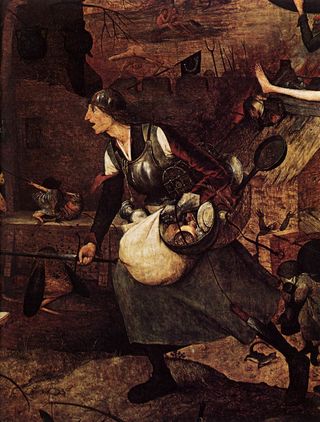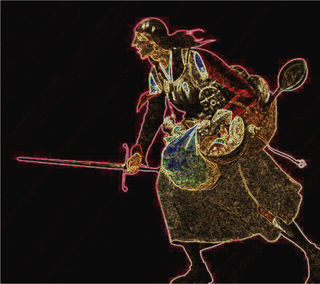Health
The Epic Battle for Mental Health and Inner Peace
And the warrior women who lead it
Posted January 1, 2020 Reviewed by Lybi Ma
Pop quiz for the new year! What do these four words mean?
- psychology
- psychiatry
- psychotherapy
- psychomachy
The first three are easy. But the last one stumped you, right?
That’s a shame, because a thousand years ago everyone knew it, and bringing the word back might dispel some myths we have about mental health today.
What does it mean? In Greek, psyche denotes the mind and mache a struggle or fight, so a "psychomachy" is the effort to cope with mental problems—addiction, anxiety, explosive anger, and so on—and overcome them.
We get the word from a book published 1,600 years ago in Spain. Written in Latin, Psychomachia is a short epic poem. It describes the battle in us all to slay our inner demons and win peace of mind.
And the remarkable thing is that in the poem, the combatants who wage the war and slay those demons—the "coping mechanisms"—are all women.

These warrior women suit up in armor like valkyries, face their enemies, swing their swords, and walk away victorious. In the end, they crown their victory by constructing a shrine to Peace. It’s awesome.
The author of this incredible allegory was a genius named Prudentius (348 – after 405). He interpreted the word psychomachia as a battle of your mind, in your mind, for your mind—or indeed, for your very life (which is another meaning of psyche in Greek).
And as he tells it, the action is intense, exciting, pulse-pounding. It's cinematic.
How does it work? The story is told episodically, in pairs of duels. In one of the best, Wrath fires a spear at Patience, her nemesis, but it fails:
Thrown with a good aim, the long sharp shaft strikes against the belly of Patience, but falls into the dust. The virtue has wrapped her body in a jacket of steel links.
The symbolism and lesson are clear. Patience gets the better of Wrath not just by outlasting her—by being “patient”—but because she has prepared her defenses in advance. The negativity simply bounces off her. Hence,
Patience stands there quite unruffled while a storm of weapons falls at her brave feet…. While she stands unmoving, Patience watches her foe rage in an uncontrolled frenzy. But Patience waits, because Wrath will perish by her own violence.
And that she does.
Only one thing remains: Wrath had spent all her energies and won nothing for herself; her unreasoning anger turns on herself and she prepares for suicide. She picks up one of her useless weapons; she puts the shaft in the dirt and falls on the upturned point.
Again, his point is clear. In his view, we can defeat wrath—our own, or someone else’s—by steeling ourselves and waiting for it to die out. Wrath will kill itself.

The whole poem is like this. Other episodes pit:
- Faith vs. Worship of the Old Gods
- Chastity vs. Lust
- Humility vs. Pride
- Sobriety vs. Indulgence
- Reason vs. Greed
- Concord vs. Discord
Some of these terms sound quaint. The key to appreciating the poem is to figure out what they mean today. For the Old Gods, think “my Old Habits" or "Enablers,” and for Faith, "my New Lifestyle." Indulgence is “Addiction”—to booze, drugs, shopping, eating, not eating, sex, you name it. For Concord and Discord, think “Serenity” and “Anxiety.” And so on.
Prudentius was a Christian but unlike Christians of later ages, he didn't blame witches, Jews, or heretics for our base impulses or mental "illnesses" (as he calls them). In his view, the demons inside us aren’t actually demons. They’re a metaphor for the conflicting desires and longings inherent in us all.
And as he sees it, the resources to win the fight lie within us. We’re born with them. In the preface, he states:
We must gather the strength within ourselves to set free every part of the body that’s hooked on and addicted to disgraceful impulses.
Prudentius offers us a profound and empowering vision of what it means to struggle with self-destructive habits and addictions.
But make no mistake. Our psychic struggle is a war, he says—a titanic struggle, and it won’t be easy. Restraining our worst impulses will take every ounce of strength we can muster, and steely resolution.
But it's worth it, he implies. Impulses can be tamed and brought to heel. We can win the war by enlisting the coping mechanisms—those warrior women—that can defeat them.
You don’t have to be a Christian or even believe in God to appreciate this poem. In fact, it may be better if you don’t.
As you make your New Year’s resolutions and struggle to keep them today, tomorrow, and in the coming weeks, Prudentius’ Psychomachia might provide some inspiration. You can read the whole thing in an hour, so it’s perfect for your next book club meeting.
Click here to read the translation by Harold Isbell that I’ve adapted above, here for the Latin, and here for a bilingual text. Skip the prologue, and for context and perspective, I recommend this new book by Aaron Pelttari highly.
References
Mastrangelo, M. (2008). The Roman self in late antiquity: Prudentius and the poetics of the soul. Baltimore: Johns Hopkins University Press.
Pelttari, A. (2019). The Psychomachia of Prudentius: text, commentary, and glossary. Norman: University of Oklahoma Press.
Nugent, S. G. (1985). Allegory and poetics: the structure and imagery of Prudentius' "Psychomachia". Frankfurt am Main: New York :bP. Lang.




